Faculty Innovators
CMC faculty and staff are on the forefront of efforts to use new technologies inside and outside the classroom. Here are members who have participated in the summits on teaching and technology at the College:
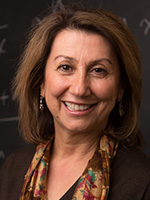
Asuman Aksoy
Crown Professor of Mathematics
George R. Roberts Fellow
Excellence, Innovation, and Technology Summit
April 2015
Prof. Aksoy has been at CMC since 1987, teaching a wide variety of courses, including analysis, complex analysis, linear algebra, advanced linear algebra and all levels of calculus. Her research interests include Banach space theory and metric geometry. She is recognized by CMC (the G. David Huntoon Award for teaching and the Roy Crocker award for merit) and holds an award for distinguished college and university teaching of mathematics from the Mathematical Association of America.
Technology: Mathematical Writing Tools
Prof. Aksoy uses the LaTeX tutorial on her website to provide students with mathematical writing tools, which include homework class file, Beamer and Poster examples.
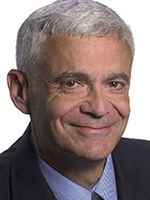
William Ascher
Donald C. McKenna Professor of Government and Economics
Strategic Educational Technology Summit
April 2014
Prof. Ascher has been at CMC since 2000, teaching courses on environmental and natural resource policy, development policy, and international organizations. He was CMC’s dean of the faculty from 2000 to 2005, and currently chairs the International Relations Program. His most recent publications include Knowledge in the Environmental Policy Process (with Robert Healy and Toddi Steelman) and Bringing in the Future: Strategies for Farsightedness and Sustainability in Developing Countries. He also has written several recent chapter contributions focusing on economic development patterns in Latin America as well as social policy in Indonesia.
Technology: Lecture capture
To maintain contacts in the international energy industry, he taught a hybrid face-to-face and online course for the Global Energy Management mid-career program at the University of Colorado, Denver.
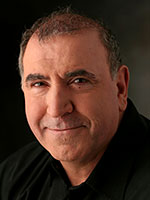
Bassam Frangieh
Professor of Arabic
Excellence, Innovation, and Technology Summit
January 2017
CMC Professor Bassam Frangieh joined CMC in 2008 after teaching at Yale University, Georgetown University and the Foreign Service Institute. He received the Yale College Prize for Teaching Excellence, and at CMC, the Glen R. Huntoon Award for Superior Teaching.
His textbook, Arabic for Life, was published by Yale University Press. Frangieh intended the text to serve for both beginning and intermediate level college Arabic students. According to a review of the text on Yale University Press, Arabic for Life is unlike other Arabic textbooks, which focus on either grammar or proficiency. It instead offers a balanced methodology that combines these goals, including reading, writing, speaking, listening, grammar, vocabulary and culture. The text includes more than 80 videos and 100 audio files. The videos were all filmed at CMC. Recently, he transformed the modes of sharing these multimedia files; all are now available in an online format. These supplements, including new items since the book’s first launch, provide greater cultural context and allow students to see Arabic in action.
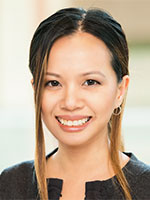
Stacey N. Doan
Associate Professor of Psychology
Director of the Berger Institute
Excellence, Innovation, and Technology Summit
November 2018
Dr. Doan's work focuses on integrating biological and psychological perspectives to understand social determinants of physical health and psychological well-being. She approaches her studies through the lens of the socio-cultural-fit hypothesis, which emphasizes the person-situation interaction and highlights how psychological processes may vary across cultures and contexts. This understanding would lead to different solutions to the same problems of healthy adaptation and development, as well as acknowledging different strengths.
Her work is funded by the National Institutes of Health, and has been published in the top developmental and health journals.
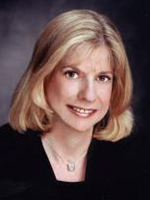
Diane Halpern
McElwee Family Professor Emerita of Psychology
George R. Roberts Fellow
Strategic Educational Technology Summit
April 2014
Prof. Halpern has won many awards for her teaching and research. Most recently, she received the 2013 Association for Psychological Science James McKeen Cattell Fellow Award for a lifetime of outstanding contributions to applied psychological research. She is a past president of the American Psychological Association, the Western Psychological Association, the Society for the Teaching of Psychology, and the Division of General Psychology. Prof. Halpern has published hundreds of articles and over 20 books including Thought and Knowledge: An Introduction to Critical Thinking, Sex Differences in Cognitive Abilities, and Women at the Top: Powerful Leaders Tell Us How to Combine Work and Family (co-authored with Fanny Cheung). Her other recent books include Psychological Science (4th ed. with Michael Gazzaniga and Todd Heatherton) and the edited book, Undergraduate Education in Psychology: A Blueprint for the Future of the Discipline.
Technology: Operation ARA — What We Can Learn About Scientific Reasoning from Aliens and Avatars
Operation ARA is a serious game developed by Keith Millis (Northern Illinois University), Art Graesser (University of Memphis), and Diane F. Halpern (Claremont McKenna College) with input from a team of marvelous professionals, talented students, and snotty avatars. It was funded with a multiyear grant from the U. S. Department of Education (Institute for Educational Sciences) and is commercially available from Pearson Higher Education, Publishers.
Your mission: to expose the aliens who endeavor to take over Earth by stealing our natural resources, spreading bad science, and lulling mankind into mindless consumerism. These aliens must be stopped. As an agent with the Federal Bureau of Science, you will receive the latest training methods to spot aliens posing as human scientists, you will identify the flaws in research from a variety of fields, and you will interrogate suspected alien spies.
This is the science-fiction plot behind Operation ARA, an Intelligent Tutoring System (ITS) that teaches scientific reasoning and critical thinking skills. Student players become Federal Bureau of Science agents-in-training charged with defending Earth from aliens who are intent on destroying it. To defend Earth, student agents must learn the principles of the scientific method and critical thinking. The student players then must use these principles to evaluate case studies and interrogate suspected alien scientists.
Operation ARA employs the scientific principles of learning and serious games. Students are engaged in the material using the pedagogical principles of active learning, immediate feedback, dialog interactivity, multimedia effects, distributed practice, and transfer of learning. “Hard fun” is another principle that may increase the success of educational or epistemic games. This phenomenon describes the resulting sense of satisfaction students experience after struggling to understand a difficult topic. That is, the student’s enjoyment should increase as the game moves from teaching basic declarative knowledge in the first module to the use of this knowledge in the analysis of ecologically valid cases in the later modules.
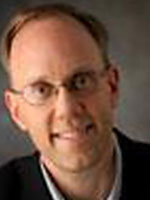
Eric Helland
William F. Podlich Professor of Economics
George R. Roberts Fellow
Excellence, Innovation, and Technology Summit
February 2016
Prof. Helland joined CMC in 2001 and is the William F. Podlich Professor of Economics and George R. Roberts Fellow. Beginning in 2016-17, he will be teaching in the expanded Philosophy, Politics, and Economics Program (PPE), a rigorously interdisciplinary program whose success at the college has led to an expansion that began with Philosophy, followed by Government, and with Helland, Economics in 2016.
A specialist in microeconomics and in the relations of law and economics, Prof. Helland has published numerous articles, essays, and working papers. He has been a visiting fellow at the Leonard D. Schaeffer Center for Health Policy and Economics, a visiting professor of law at UCLA, and a visiting faculty member at the University of Chicago School of Business. In addition to these achievements, he has had extensive research and administrative experience with the Rand Corporation, and is the editor of the International Review of Law and Economics. An engaging lecturer and discussion leader, his teaching success has been recognized by the G. David Huntoon Senior Teaching Award in 2010 and 2014.
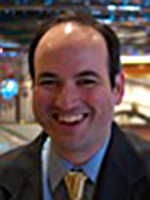
Mark Huber
Fletcher Jones Foundation Professor of Mathematics and Statistics
George R. Roberts Fellow
Strategic Educational Technology Summit
April 2014
Mark Huber joined CMC in the Department of Mathematical Sciences in 2009. He works in the area of computational probability, designing Monte Carlo methods for applications in statistics and computer science. His areas of expertise are probability, statistics, computers, applied mathematics, and calculus.
Technology: Using Instructional Videos In and Out of the Classroom
Together with colleague Deanna Needell, Prof. Huber demonstrated several different ways videos can be used in a typical class. He discussed the pros and cons of the many types of videos, as well as different software for easily creating videos. He has shared his experiences using this type of video as a supplemental learning tool and as an extra-credit vehicle.
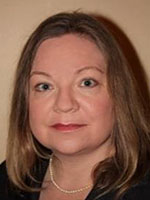
Cynthia Humes
Associate Professor of Religious Studies
Excellence, Innovation, and Technology Summit
January 2017
Excellence, Innovation, and Technology Summit
February 2016
Excellence, Innovation, and Technology Summit
April 2015
Cynthia Humes joined CMC’s Religious Studies Department in 1990. As Associate Vice President for Information Technology and Chief Technology Officer, Humes oversees management of all aspects of technology at Claremont McKenna College. Humes has worked to champion innovation in pedagogy locally and nationally, making presentations and writing on the subject of technology and higher education. Humes strives to remain an active contributor to the field of Religious Studies as well; her research revolves around the history of Hinduism with specific interests in models of religious leadership, Hinduism in America, Religion and Politics, goddess worship, and gender. Outside of her work in technology and Religious Studies at Claremont McKenna College, Humes is in her eighth and final year serving as a Planning Commissioner for the city of Claremont, California.
Selected Research and Publications:
• “The Ivory Tower and the Cloud. Understanding Cloud Computing,” (Thomson Reuters/Aspatore: 2010 edition, Inside the Minds series), Cynthia Ann Humes with Jeremy Whaley.
• “Staying in the IT Game on Campus. Updating Your Company's Technology Strategy: Leading CTOs and CIOs on Working with the Executive Team,” Managing Budget Constraints, and Delivering Business Value (Thomson Reuters/Aspatore: 2010 edition, Inside the Minds series.
• The Sweet Teachings of the Blessed Sankaracarya: Swami Brahmananda Saraswati. Introduction by LB Shriver and translation from Hindi and Sanskrit by Cynthia Ann Humes. Fairfield, Iowa: LBS Imprints, 2013.
• Breaking Boundaries with the Goddess: New Directions in the Study of ??ktism. By Cynthia Ann Humes and Rachel Fell McDermott. Delhi: Manohar Publishers & Distributors, 2009.
• Gurus in America. By Thomas Forsthoefel and Cynthia Ann Humes. Albany: SUNY Press, 2005.
• Living Banaras: Hindu Religion in Cultural Context. By Bradley R. Hertel and Cynthia Ann Humes. Albany: SUNY Press, 1993.
Selected Awards and Affiliations:
• South Asian Visual Culture and Expressions of Religious Identity, Social Construction, and Nation, Mellon Foundation Grant
• Fellow, Frye Institute
• American Institute of Indian Studies Research Fellowship
• Charlotte W. Newcombe Fellowship
• Fulbright-Hays Grant
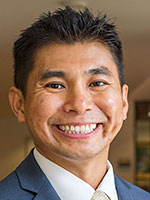
Wei-Chin Hwang
Professor of Psychology
Excellence, Innovation, and Technology Summit
January 2017
In addition to being a tenured, full-time professor, Wei-Chin has an individualized therapy practice and consulting agency in both Pasadena and Claremont. He specializes in treating mood disorders, marital and family problems, traumas, adjustment difficulties, personal growth and development, and culture and mental health issues. He takes an integrative cognitive-behavioral, psychodynamic, and solution-focused approach to treating clients, and conducts therapy in English, Mandarin, or Taiwanese. He also provides professional consulting as an expert witness on legal cases, workplace mental health, conflict management, and cultural competency and effectiveness issues.
Wei-Chin Hwang is the recipient of over twenty grants and author or co-author of well over 50 articles, manuals, and books. Wei-Chin has received multiple awards, including (but not limited to) the following: CMC’s Roy P. Crocker Award for Merit; Induction as a Fellow of the Asian American Psychological Association for unusual and outstanding contributions to Asian American Psychology; The American Psychological Association Minority Fellowship Program Early Career Award; the AAPA Early Career Award for Distinguished Contributions from the Asian American Psychological Association; and the WPA Enrico E. Jones Award in Clinical Psychology Research.
Most recently, Wei-Chin has won the Claremont Colleges Diversity Mentor Award, which is given to just one faculty member annually as part of our 7C Faculty Diversity Awards. The award honors his outstanding active support of students, staff, and/or colleagues from marginalized identities and backgrounds and their work to ensure the success of the community as a whole.
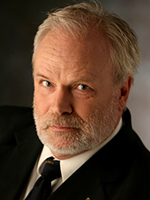
Manfred Keil
Associate Professor of Economics
Excellence, Innovation, and Technology Summit
April 2015
Strategic Educational Technology Summit
April 2014
Prof. Keil’s research focuses on aggregate labor market outcomes, comparative economic performance of countries and regions, issues in finance, politico-economic interaction, and the study of business cycles. His publications have appeared in the Journal of Applied Econometrics, Journal of Development Economics, Journal of Macroeconomics, Oxford Economic Papers, and Weltwirtschaftliches Archiv, among others. Most recently he has started work with students at the Lowe Institute on economic issues facing the Southern California economy and the Inland Empire in particular.
Prof. Keil received his Ph.D. from the London School of Economics. He joined the faculty of Claremont McKenna College in 1995. He has taught in the Robert Day School of Economics and Finance (formerly the Department of Economics) since then, primarily in the fields of macroeconomics, econometrics, and statistics. In the summer of 2009, he completed his three-year term as the chairman of the faculty of the RDS. Before coming to CMC, he held appointments in Boston, Montreal, and England. In addition to being a faculty member at the RDS, he is a research fellow of both the Lowe and the Rose Institutes.
Technology: Flipped Classroom
"At the beginning of the first lecture in Econ 120, Statistics, in January, I announced 'There is good news and bad news for you. The good news is that I am flipping the classroom, the bad news is that I am doing this for the first time.' Since only 5 of the 45 students knew what 'flipping the classroom' meant, there was not much good news, period. It has been a wild ride for much of the semester. I will report on the advantages and disadvantages of this new teaching method as I see it."
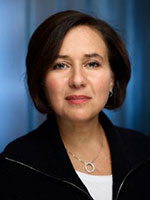
Amy Kind
Russell K. Pitzer Professor of Philosophy
Director of the Gould Center for Humanistic Studies
Excellence, Innovation, and Technology Summit
November, 2018
Excellence, Innovation, and Technology Summit
January 2017
Excellence, Innovation, and Technology Summit
April 2015
An award-winning Philosophy professor, Amy Kind joined the CMC faculty in 1997. Amy served as an Associate Dean of the Faculty from 2005 to 2008, and then was chair of her department from 2009 to 2012. At CMC, she teaches classes in philosophy of mind, metaphysics, and logic, and she also regularly offers a Freshman Humanities Seminar on "Life, Death, and Meaning."
Amy’s research interests lie broadly in the philosophy of mind, though most of her published work has concerned issues relating either to the imagination or to phenomenal consciousness. Amy is the author of the introductory textbook on personal identity called Persons and Personal Identity (Polity 2015). With Peter Kung, she has edited the collection, Knowledge Through Imagination, (Oxford University Press, 2016), she has also edited The Routledge Handbook of Philosophy of Imagination (Routledge, 2016), and Philosophy of Mind in the 20th and 21st Centuries (Routledge, 2018).
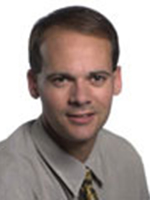
Dan Krauss
Professor of Psychology
Excellence, Innovation, and Technology Summit
April 2015
Prof. Krauss completed a joint degree program in psychology and law at the University of Arizona, receiving his J.D. and then his Ph.D. in clinical psychology and psychology, policy, and law. He is a full professor and chair of the Department of Psychology, and has published over 50 research articles, books, and book chapters (with 9 CMC undergraduate co-authors) relating to clinical psychological evaluations for the courts, legal and psychological expertise, evidentiary admissibility standards, and juries’ ability to process complex expert testimony in their decision-making. He is the co-author of The Psychology of Law: Human Behavior, Legal Institutions, and Law (APA Publishing, 2015), and the textbook Forensic and Legal Psychology (Worth, 2012; 2nd edition, 2015; Canadian edition, 2014), which he uses in his popular forensic psychology class. He has also co-edited three books — Jury Psychology: Social Aspects of the Trial Process. Vol I.; Psychological Expertise in Court. Vol II (Ashgate, 2009); Expert Testimony for the Courts (Lawrence Erlbaum, 2007) — and is the co-editor of Law and Public Policy: Psychology and the Social Sciences, a book series published by the American Psychological Association (APA Publishing). Prof. Krauss is licensed to practice law in Arizona, is a member of the United States Supreme Court Bar, and has served as the United States Supreme Court Fellow to the U.S. Sentencing Commission. He is a licensed clinical psychologist in the state of California, and a diplomate in forensic psychology, board certified by the American Board of Professional Psychology. He was awarded the Early Career Research Award by the Western Psychological Association.
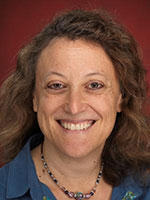
Shana Levin
Crown Professor of Psychology
George R. Roberts Fellow
Associate Dean of the Faculty
Excellence, Innovation, and Technology Summit
November 2018
Excellence, Innovation, and Technology Summit
April 2015
Shana Levin is Crown Professor of Psychology and George R. Roberts Fellow at Claremont McKenna College. She has been on the faculty at CMC since 1998 and Associate Dean of the Faculty for Research since 2016. She was Chair of the Psychology Department from 2011-2013 and received the G. David Huntoon Senior Teaching Award in 2012. She teaches Psychological Statistics, Social Psychology, Psychology Senior Research Seminar, and Seminar in Prejudice and Intergroup Relations. Her research examines cross-cultural intergroup conflict. She received the Early Career Research Award from the Western Psychological Association and is a Fellow of the Western Psychological Association, Society of Experimental Social Psychology, and Society for the Psychological Study of Social Issues.
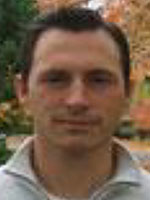
Dustin Locke
Associate Professor of Philosophy
Excellence, Innovation, and Technology Summit
January 2017
Dustin joined the faculty at CMC in the Fall of 2009. In addition to metaphysics and epistemology, he enjoys teaching courses in Philosophy of Science, Philosophy of Religion, and Logic. His primary research area is in Epistemology and Metaphysics, but he also has interests in Philosophy of Science, Philosophy of Religion, and Philosophy of Language. Currently, he is working on two main projects: (1) the relationship between rational belief and rational action, and (2) the alleged meta-normative implications of evolutionary theory.
Recently, Dustin has become interested in the philosophical implications of virtual reality technologies, and he is offering a new course this semester called, “Fact, Fiction, and Simulation,” centered on the ethics, metaphysics, and epistemology of simulated and fictional worlds. Both he and his students use virtual reality headsets in the course.
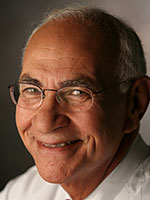
Marc Massoud
Robert A. Day Distinguished Professor of Accounting
Excellence, Innovation, and Technology Summit
January 2017
Professor Massoud is a true legend at CMC for his having received the Huntoon Superior Teaching Award a record 13 times. That is not a misprint; 13 times.
He is famed for his high standards and difficult classes, yet care and nurturing of his students to help them succeed at CMC and beyond.
Born and raised in Alexandria, Egypt, Marc came to the United States in 1967. With an MBA and Ph.D. from New York University, he arrived at CMC in 1980. He has published and taught about Accounting, Accounting for Non-Profit Organizations, Banking, Cost Management, and International Accounting.
In 2010, Marc was honored with the Presidential Award for Merit.
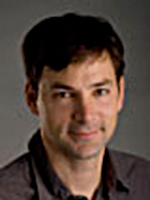
Daniel Michon
Associate Professor of Religious Studies
Excellence, Innovation, and Technology Summit
February 2016
Strategic Educational Technology Summit
April 2014
Prof. Michon joined CMC in 2007 and teaches courses on South Asian religious history. His research specialty crosses the disciplinary boundaries of archaeology, religion, history, and numismatics. His book, Archaeology and Religion in Early Historic Punjab: History, Theory, Practice is coming from Routledge India. In his work, he uses digital technologies to aid his interpretation of archaeological data. To that end, he was awarded a National Endowment for the Humanities research grant for his project, “Virtual Taxila.”
Technology: Digital Humanities
While digital humanists have certainly struggled to find a single definition for the broad movement called “Digital Humanities,” the lack of a singular definition has not completely silenced their voices within the academy. For example, there now exist peer-reviewed journals, dedicated annual conferences, and academic research centers associated with the term. However, for many academics, the key question is not what is digital humanities, but rather more simply, what is the purpose of digital humanities? Prof. Michon discussed the emerging, and in fact already contentious, debate concerning the role of the digital humanities in academia.
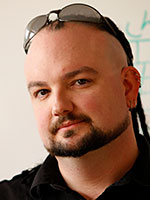
Sam Nelson
Professor of Mathematics
Excellence, Innovation, and Technology Summit
January 2017
Sam completed his doctorate at Louisiana State University and after stints teaching at other colleges and universities, he arrived at Claremont McKenna College in 2008.
As a topologist, he specializes in low-dimensional topology, algebraic topology and combinatorial topology. He is particularly interested in conducting research and publishing with students on knot theory.
In 2014, he received a prestigious Collaboration Grant for Mathematicians from the Simons Foundation to support his research, which includes algebraic topology and knot theory—a field that examines the three-dimensional geometry of knot shapes, which may one day help genetic scientists better understand the structures of molecules.
In addition to presenting at multiple locations in the United States, Professor Nelson recently gave invited talks internationally at “Knots in Hellas,” at the International Olympic Academy in Ancient Olympia (Athens, Greece - July 2016), the 8th KOOK-TAPU workshop on Knots and Related Topics (Pusan, South Korea - July 2016), as well as the International Workshop on Spatial Graphs (Tokyo, Japan - August 2016).
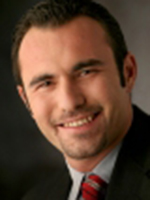
Serkan Ozbeklik
Associate Professor of Economics
Excellence, Innovation, and Technology Summit
April 2015
Serkan Ozbeklik is an associate professor of economics at The Robert Day School of Economics and Finance at Claremont McKenna College. He received his Ph.D. in Economics from the Ohio State University, his M.A. in Economics from University of Guelph, and his B.A. from Marmara University. Prof. Ozbeklik’s primary research and teaching interests lie in the fields of labor economics and the economics of education. His most recent research examines how peers affect student achievement in disadvantaged schools, the impact of teacher gender on student achievement, and the effectiveness of Teach for America and Job Corps programs. Since arriving at Claremont McKenna College he has taught principles of economics, intermediate microeconomic theory and econometrics. Currently, Prof. Ozbeklik is in the process of designing a course in the economics of education.
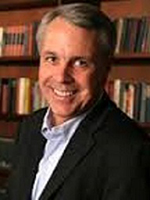
Jonathan Petropoulos
John V. Croul Professor of European History
Excellence, Innovation, and Technology Summit
April 2015
Jonathan Petropoulos is the John V. Croul Professor of European History at Claremont McKenna College in Southern California. Previously, he received his Ph.D. from Harvard University (1990), where he began working on the subject of Nazi art looting and restitution in 1983. He is the author of Art as Politics in the Third Reich (University of North Carolina Press, 1996); The Faustian Bargain: The Art World in Nazi Germany (Oxford University Press, 2000); Royals and the Reich: The Princes von Hessen in Nazi Germany (Oxford University Press, 2006); and Artists Under Hitler: Collaboration and Survival in Nazi Germany (Yale University Press, 2014). He has also co-edited a number of volumes, including The Spoils of War (Harry Abrams, 1997) and Gray Zones: Ambiguity and Compromise in the Holocaust and its Aftermath (Berghahn, 2005). He has also appeared in more than a dozen documentary films, including Rape of Europa (Actual Films, 2007) and helped organize art exhibitions, including Degenerate Art: The Fate of the Avant-Garde in Nazi Germany, which opened at the Los Angeles County Museum of Art in 1991.
From 1998 to 2000, he served as Research Director for Art and Cultural Property on the Presidential Commission on Holocaust Assets in the United States, where he helped draft the report, Restitution and Plunder: The U.S. and Holocaust Victims’ Assets (2001). In his capacity as research director, Petropoulos testified before the U.S. House of Representatives’ Committee on Banking and Financial Services and the U.K. Houses of Commons’ Select Committee on Culture, Media, and Sport. He has also served as an expert witness in over a dozen cases where Holocaust victims have tried to recover lost artworks. This includes Altmann v. Austria, which involved five paintings by Gustav Klimt claimed by Maria Altmann and other family members (including the “Golden Adele,” which is exhibited in New York’s Neue Galerie).
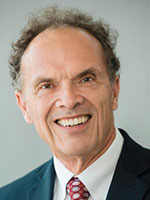
John J. Pitney, Jr.
Roy P. Crocker Professor of Politics
Excellence, Innovation, and Technology Summit
November 2018
John J. Pitney, Jr., is the Roy P. Crocker Professor of American Politics at Claremont McKenna College in Claremont, California. He received his B.A. in political science from Union College, where he was co-valedictorian. He earned his Ph.D. in political science at Yale, where he was a National Science Foundation Fellow. From 1978 to 1980, he worked in the New York State Senate. From 1983 to 1984, as a Congressional Fellow of the American Political Science Association, he worked for Senator Alfonse D'Amato of New York and the House Republican Policy Committee, chaired by Representative Dick Cheney of Wyoming. From 1984 to 1986, he was senior domestic policy analyst for the House Republican Research Committee. He joined the Claremont McKenna College faculty in 1986. From 1989 to 1991, during a leave of absence, he worked at the Research Department of the Republican National Committee, first as deputy director, then as acting director. He has written articles for the Washington Post, Politico, the Wall Street Journal, the Los Angeles Times, and Roll Call, among others. His scholarly works include The Art of Political Warfare (University of Oklahoma Press), The Politics of Autism (Rowman and Littlefield) and (with Joseph M. Bessette), American Government and Politics: Deliberation, Democracy, and Citizenship (Cengage).
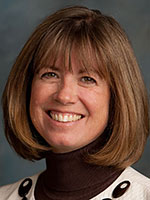
Cathy Reed
McElwee Family Professor of Psychology
George R. Roberts Fellow
Excellence, Innovation, and Technology Summit
February 2016
Prof. Reed, who joined CMC in 2007, is the McElwee Family Professor of Psychology and George R. Roberts Fellow. She uses electrophysiology (EEG/ERP) and behavioral methods to investigate the influences of the body on attention, perception, emotional processing, and economic decision making. Her publications have appeared in Cortex, Brain, Social Neuroscience, Attention Perception & Performance, and Emotion among others. Her grants from the NSF help to train students in EEG/ERP data collection and analysis, providing them with skills relevant for positions in medical and research laboratories.
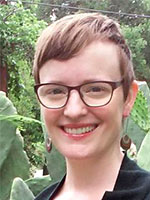
Ellen K. Rentz
Associate Professor of Literature
Associate Dean of the Faculty
Excellence, Innovation, and Technology Summit
January 2017
Ellen joined the Literature Department in CMC in 2009, having received an MA in Medieval Studies from University of York, England, and an MA, M. Phil, and doctorate in English from Columbia University in New York. Among various honors, most recently she has received a Mayers Fellowship at the Huntington Library in 2014 and an NEH Summer Scholarship in 2015.
Ellen’s teaching interests include Medieval literature and culture, Chaucer, Dante, gender studies, and drama. Her research spans Middle English literature and drama, medieval religious culture, travel narrative, urban studies, and history of the book. In her 2015 book, Imagining the Parish in Late Medieval England (Ohio State University Press), Ellen examines the self-identifying power of parochial life in everything from the sermons, prayers, and poetry to the paintings and stained-glass imagery reminding common folk of their higher aspirations. Her book seeks “to enrich our understanding of why the parish and the ideal of collective worship mattered to late medieval laypeople.”
Ellen has served on CMC’s Campus Climate Task Force (CCTF), and is co-chair of the multi-disciplinary Gender and Sexuality Studies Sequence, which is committed to the critical analysis of gender and sexuality.
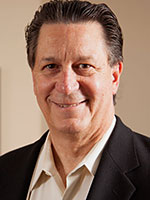
Ronald Riggio
Henry R. Kravis Professor of Leadership and Organizational Psychology
Excellence, Innovation, and Technology Summit
November 2018
Excellence, Innovation, and Technology Summit
February 2016
Prof. Riggio joined CMC in 1996 and is the Henry R. Kravis Professor of Leadership and Organizational Psychology. He has directed the Kravis Leadership Institute, is past president of the Western Psychological Association (WPA), and is the author or editor of more than a dozen books, and nearly 150 journal articles and book chapters in psychology, leadership, and management. His most recent book is What’s Wrong with Leadership (Routledge), and he co-authored (with Bernard Bass) Transformational Leadership and The Practice of Leadership: Developing the Next Generation of Leaders (co-edited with CMC professor Jay Conger; Jossey-Bass). His textbook, Introduction to Industrial/Organizational Psychology (Prentice-Hall) has been published in its seventh edition. In his numerous columns for Psychology Today, Riggio has examined leadership from a number of different angles finding the not-so-obvious, and even the amusing, in his discoveries.

Andrew Schroeder
Associate Professor of Philosophy
Excellence, Innovation, and Technology Summit
April 2015
Andrew Schroeder is an assistant professor in the philosophy department. His research focuses on both abstract questions in normative theory, and practical questions in bioethics. He has taught courses in both areas, as well as courses seeking to tie the two together.
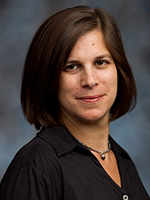
Diana Selig
Kingsley Croul Associate Professor of History
George R. Roberts Fellow
Excellence, Innovation, and Technology Summit
January 2017
Excellence, Innovation, and Technology Summit
April 2015
Diana Selig is the Kingsley Croul Associate Professor of History and a George R. Roberts Fellow. She is author of Americans All: The Cultural Gifts Movement, which tells the story of early efforts at multicultural education. At CMC, her teaching includes courses on women and politics in America, America in Depression and war, gender and society, and U.S. gay and lesbian history.
In 2016, Diana was the keynote speaker at CMC’s Convocation. Her speech “Making History,”, where she discussed community and activism, is available online.
Diana served on the Campus Climate Task Force (CCTF) and was co-chair of the PSR Committee on Campus Climate. In 2014, she received the Faculty Award from the Queer Resource Center in recognition of her outstanding support of LGBTQ students at the five colleges. Most recently, Diana won The Claremont Colleges Diversity Teaching Award. This seven-college award is given to just two faculty annually, and it recognizes those who regularly and effectively address issues or concerns related to diversity and inclusion through their classroom practices and curriculum.
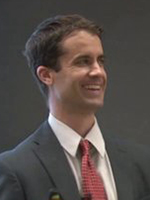
Cameron Shelton
McMahon Family Associate Professor of Political Economy
George R. Roberts Fellow
Excellence, Innovation, and Technology Summit
April 2015
Cameron Shelton is an Associate Professor of Economics in The Robert Day School. He received his Ph.D. in political economy from the Stanford Graduate School of Business in 2005. Prof. Shelton’s first teaching experience was as a post-doc teaching masters students in the Freeman Spogli Institute for International Studies at Stanford University. He then taught for two years at Wesleyan University before coming to CMC in 2008. At CMC he has taught mostly macroeconomics at the intermediate and advanced levels, but elsewhere he has taught courses in economic growth, game theory, social choice, and public economics.
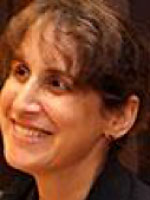
Jenny Taw
Associate Professor of Government
Excellence, Innovation, and Technology Summit
November 2018
Excellence, Innovation, and Technology Summit
February 2016
Jenny Taw joined CMC in 2006 and she teaches international relations, security studies, and U.S. foreign policy. She spent a decade at the Rand Corp., where she focused on counterinsurgency, counterterrorism, and peacekeeping. Her major research interests include American Foreign Policy, Conflict, Defense, Defense Policy of the U.S., International Relations Theory, International Strategic Studies, Security Studies, War and Foreign Relations, and War/Strategy. Taw has been on the editorial advising board of The Journal of Conflict Studies, Small Wars and Insurgencies, and Combating Terrorism Exchange. In addition, she has been a contributing editor of Studies in Conflict and Terrorism since 2001.
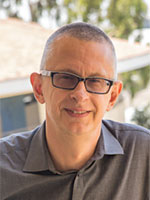
Peter Uvin
Professor of Government
Excellence, Innovation, and Technology Summit
November 2018
Excellence, Innovation, and Technology Summit
January 2017
Excellence, Innovation, and Technology Summit
February 2016
Dean Peter Uvin joined CMC in 2015 as the Vice President for Academic Affairs and Dean of the Faculty. A native of Belgium, Peter earned a doctorate in international relations at the Graduate Institute of International and Development Studies in Geneva, Switzerland. Before coming to CMC, he was Provost at Amherst College and Academic Dean at the Fletcher School of Law and Diplomacy at Tufts University.
The African Studies Association honored his Aiding Violence: The Development Enterprise in Rwanda as the most outstanding book of 1999. In 2006, he was awarded a Guggenheim Fellowship, which he used to conduct research in Burundi, one of the poorest countries in the world, on life in a post-civil war environment, and about which he wrote Life After Violence: A People’s Story of Burundi (London, Zed books, 2008). He wrote multiple other books and tens of articles on food, NGOs, development, conflict, and human rights, foremost in Rwanda and Burundi.
Peter serves as the chief academic officer of the College, working in close partnership with the president, faculty, staff, and students to advance the mission and success of the College. Peter is responsible for leadership of the curriculum, the College’s many research institutions and centers, sponsored research, academic planning and advising, global education, the registrar, institutional research, and other areas of the academic program.
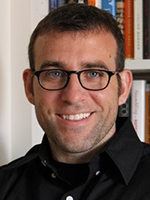
Piercarlo Valdesolo
Associate Professor of Psychology
Excellence, Innovation, and Technology Summit
February 2016
Strategic Educational Technology Summit
April 2014
Prof. Valdesolo joined CMC in 2011 and is currently assistant professor of psychology and director of the Moral Emotions and Trust Lab. He teaches courses in social and moral psychology and his research explores the psychological bases of trust, cooperation and moral judgment. He is co-author of the book Out of Character and his work has been featured in venues such as the New York Times, the Atlantic, and the Washington Post. He is a member of the editorial boards of the journals Emotion, Journal of Experimental Social Psychology and Journal of Personality and Social Psychology, and he is a regular contributor to Scientific American and Psychology Today.
Technology: Social Media in the Classroom
"'Who sends emails anymore?' This was a high school student's dismissive response to an audience member's comment at a recent panel on cyber-bullying at Facebook headquarters in Menlo Park. It shook my sense of tech-competence to the core. The manner in which our students relate to each other is mediated by increasingly sophisticated technology, and research has shown that this is systematically altering the way they process information more generally." Prof. Valdesolo discussed how he has incorporated social networking tools into his classroom and laboratory, in an attempt to keep pace with this trajectory.

Nicholas Warner
Professor of Literature
Excellence, Innovation, and Technology Summit
April 2015
Nicholas Warner received his B.A. in English from Stanford University, and the M.A. and Ph.D. in English from UC Berkeley. He has taught at Oberlin College and Claremont McKenna, where he is Professor of Literature. His research interests include 19th-century English, American, and Russian literature, especially during the Romantic period, and he is the author of numerous articles in these fields, as well as of Spirits of America: Intoxication in Nineteenth-Century American Literature (CHOICE Outstanding Book Award, 1999). His edited volume, In Vino Veritas: An Anthology of Drinking in Literature, was published in 2012. Prof. Warner’s teaching at Claremont has been recognized by eight Huntoon teaching awards, the first in 1983, and the most recent in 2013. His most recent research interests center on the depiction of leadership and of leader-follower relations in literature, art, and film.

Emily Wiley
Professor of Biology
Excellence, Innovation, and Technology Summit
April 2015
Emily Wiley received her Ph.D. in molecular genetics from the University of Washington. Funded by several grants from the National Science Foundation, her research explores how genome structure controls the processing of DNA information. Grants have also funded her interest in teaching science by doing science – how to broaden access and engage larger numbers of students in authentic research experiences. With a recent CAREER Award, she developed an international genomics consortium of colleges and universities for students to research and publish discoveries on gene function. This work has been shared in research articles and a book chapter, and served to engage LA city high school students in genome research. A recent NSF IUSE (Improving Undergraduate Science Education) award will support broad dissemination of her model for research-education integration through the genomics consortium. A techniques book that she co-edited to support student research, Current Protocols – Essential Laboratory Techniques"
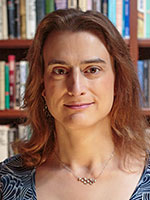
Nancy Williams
Associate Professor of Chemistry
Excellence, Innovation, and Technology Summit
January 2017
Nancy Williams, an HMC graduate, returned to Claremont to Keck Science in 2003. Her scholarship has focused on the making and breaking of carbon-carbon and carbon hydrogen bonds with platinum complexes. She has taught courses in inorganic chemistry, organic chemistry, general chemistry, advanced laboratory in chemistry, inorganic synthesis, and an FHS course on the intellectual roots of the 17th century transition to modernity in England, the American Colonies, and The Netherlands.
Nancy is a founding member of IONiC, the Interactive Online Network of Inorganic Chemistry, the online community of Inorganic Chemistry, partnered with the American Chemical Society Division of Inorganic Chemistry. IONiC has three main initiatives: VIPEr (the Virtual Inorganic Pedagogical Electronic Resource, the online home of IONiC, where professors of Inorganic Chemistry share teaching materials), the Undergraduates at the Frontiers of Inorganic Chemistry annual symposium at the American Chemical Society National Meeting, and a workshop series dedicated to bringing cutting edge research into the undergraduate classroom. IONiC has received grants totaling over $600,000 in its six years of existence, mostly from the National Science Foundation, with minor support from the Mellon Foundation and NITLE.
Nancy has authored or co-authored well over a dozen publications since coming to Keck Science. Nancy teaches in AISS, the Accelerated Integrated Science Sequence, an innovative course team-taught by biology, chemistry, and physics faculty to highly promising incoming first-year students who demonstrate an interest in learning science in an interdisciplinary mode.
